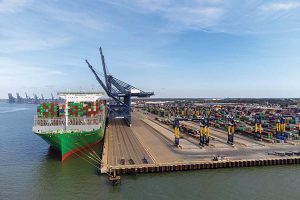Europe wants US tech giants to pay more taxes, but it’s been oddly reticent about the cosy and highly unusual tax arrangements of one of its own dominant industries: container shipping. Given the outsized profits the industry is generating, the current regime is unsustainable.
Freight rates have soared in the past two years
as pandemic disruption and surging US demand clogged up global ports. Europe has four of the world’s top five container lines, and some have amassed record profits while shortchanging taxpayers.
Danish giant AP Moller-Maersk A/S and French rival CMA CGM SA owed just 2% of their profits in taxes, according to their most recent financial filings. Germany’s Hapag-Llloyd AG paid just 37 million euros ($37 million) on profits of 8.7 billion euros in the first half of 2022 — an effective rate of 0.4%. The average corporate rate for member countries of the Organization for Economic Cooperation and Development (OECD) is around 23%.
This astonishing and increasingly indefensible advantage stems from how levies on shipping groups are based on the size of their vessels, not a percentage of their profits. (Swiss-Italian group Mediterranean Shipping Company SA is private and thus its profits and taxes aren’t disclosed.)
Estimating the amounts forgone to state coffers due to these highly favourable arrangements is complex. But it’s possible these three groups would together have had to pay as much as $25 billion more in 2021 and 2022 if they were taxed at the OECD average. Maersk said my estimate is “significantly overstated†due to depreciation effects. CMA CGM didn’t comment on the value of its foregone taxes, saying in a statement that high profits enabled it to “support the modernisation and decarbonisation of its fleet.†Hapag-Lloyd declined to comment.
In view of the soaring cost of living and the need for companies to behave as good corporate citizens, such lenient tax regimes must be overhauled. Otherwise, the argument for windfall taxes will become compelling. Though short-term (“spotâ€) freight rates have declined lately due to recession worries, ocean carrier profits remain stratospheric thanks to their success in locking desperate customers into longer-dated contracts.
Hapag-Lloyd’s operating profit margins currently exceed 50%, and it expects to make around $18.5 billion in earnings before interest and tax this year. Meanwhile, Maersk is on track to report about $31 billion in earnings before interest and taxes. Only four listed European companies will earn more than Maersk this year, all of them oil giants, according to Bloomberg data.
More than 20 European nations have implemented so-called tonnage taxes in the past three decades to help them compete against subsidised Asian peers and deter companies from shifting vessels to low-levying jurisdictions under so-called flags of convenience. Even now, landlocked Switzerland is preparing to introduce its own tonnage tax that would benefit MSC, the world’s largest shipping group.
In fairness, tonnage taxes solve the tax allocation challenges for ships operating in international waters and calling at multiple ports. Companies are charged even when they lose money, meaning in the past they paid more than they otherwise would have done. But because their profits are now an order of magnitude larger than before, the system is delivering a huge subsidy.
With the honourable exception of France, shipping companies’ arrangements have largely escaped scrutiny on this side of the Atlantic. Maersk told investors earlier this month it isn’t aware of any windfall tax initiatives that might hurt it. While the Biden administration has gone after shipping groups for alleged anti-competitive practices, it has had little to say about their taxes because the big companies are mostly foreign owned.
Happily, some of shipping’s pandemic windfall is being reinvested in less-polluting ships. The industry urgently needs to address its carbon footprint, and the extra fleet capacity, combined with weaker demand, should also help lower shipping costs somewhat from next year.
Freight rates are unlikely to return to the low levels that preceded the pandemic because the industry has
become much better at coordinating capacity. This coordination has been aided by alliances and antitrust exemptions that — surprise! — the EU has also been reluctant to review.
—Bloomberg
Chris Bryant is a Bloomberg Opinion columnist covering industrial companies in Europe. Previously, he was a reporter for the Financial Times
 The Gulf Time Newspaper One of the finest business newspapers in the UAE brought to you by our professional writers and editors.
The Gulf Time Newspaper One of the finest business newspapers in the UAE brought to you by our professional writers and editors.

